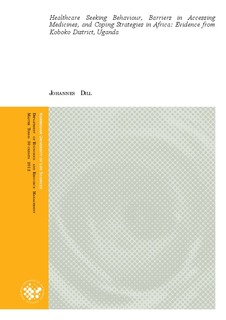Healthcare seeking behaviour, barriers in accessing medicines, and coping strategies in Africa : evidence from Koboko District, Uganda
Master thesis
Permanent lenke
http://hdl.handle.net/11250/187347Utgivelsesdato
2012-08-06Metadata
Vis full innførselSamlinger
- Master's theses (HH) [1072]
Sammendrag
Despite free healthcare in public facilities, access to medicines is a serious problem in
Uganda. Unavailability of drugs in the public sector, high prices in the private sector, and the absence of a national insurance system result in high out-of-pocket expenditures for
households. Drug shops run by the communities present an opportunity to improve access to medicines for people in the poor rural northern west district Koboko. Managed by community members and provided with medicines by a non-governmental organization, such shops could offer lower prices than the private sector. To initiate such a project insights into the local health sector are required. In this context this thesis offers a starting point for the implementation of community run drug shops. Using a household questionnaire, 105 households were surveyed in Koboko District. On average almost 3 sicknesses per household were documented resulting in a dataset of 292 sicknesses. To gain a better understanding of the current situation, household’s healthcare seeking behaviour, barriers in accessing medicines, and coping strategies with acute illness costs were investigated. Principal Component Analysis was used to estimate the socioeconomic status of each household and in addition to descriptive analysis, logistic regressions were run to identify relevant explanatory variables concerning seeking behaviours and coping strategies. Results show that most households consult mainly public health centres in case of sicknesses; this includes households with a higher socioeconomic status (contrary to what was hypothesized). Informal treatments do not play an important role. At the same time medicines are usually obtained from private facilities. Urban and wealthier households were found to have significantly better access to medicines emphasizing the problem of health equity. Unavailability of medicines and high prices in the private sector are identified as major
barriers in accessing healthcare while geographical and quality issues are less serious obstacles. To finance acute sickness costs, many households have to sell food, even though it is usually used for their own consumption. In particular rural households can seldom rely on savings. These results demonstrate that community run drug shops have the potential to improve access to medicines. Nevertheless, several challenges remain, such as promoting community awareness and the organization of a well functioning management.
